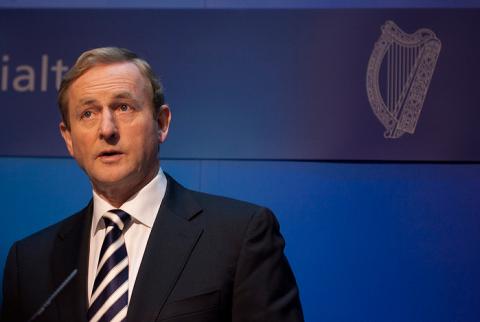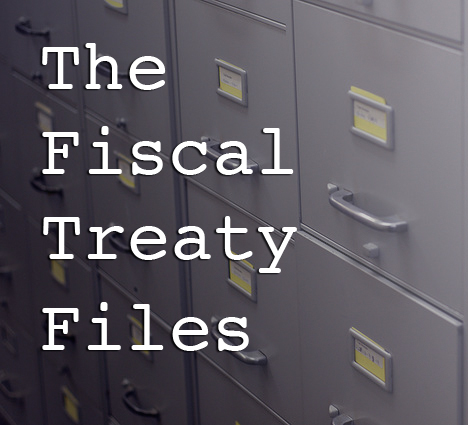Kicking the future in the face?

The Government should ease off on the scaremongering that has been a hallmark of its Fiscal Treaty referendum campaign so far. By Paul Murphy.
Enda Kenny’s Chuck Norris moment - whereby he encouraged us to vote Yes in order not to “kick the future in the face” - gave a comical aspect to the scaremongering of this government, but it underlined a very serious point. In the absence of the usual ‘social Europe’ figleafs in the Fiscal Treaty, the Government’s argument will rest overwhelmingly on fear. This fear essentially comes in two different forms – a general fear about the country’s position within Europe and our membership of the euro and EU – and a specific fear about access to funding for a so-called ‘second bailout’.
Tackling this scaremongering will be a vital part of the No campaign if people are to have the confidence to vote on the content and meaning of the Treaty, rather than being bullied into voting Yes. The No side also may have an advantage in that the mood in society seems to be tipping fear to anger. Central to this is the development of a mass anti-austerity movement against the Household Tax. The fact that the Campaign Against Household and Water Taxes has won an important victory in the first stage of the battle, with 50% (or 55% - the figure is disputed) refusing to pay, is likely to give people increased confidence to resist austerity.
The first part of the Government’s argument is to try to suggest this referendum is about the euro and membership of the EU. Enda Kenny wilfully misinformed people by saying: "The public will be focusing on the question which will be on the ballot paper - do they wish to be members of Europe, the euro and the Eurozone from now on, or do they wish not to be?" This is simply not the case. It is a referendum about joining the Austerity Club, and the question on the ballot paper is about facilitating our entry into this Club. Although the political and capitalist establishments in Europe may not be happy about us rejecting the Treaty, there is no mechanism to kick us out of the EU or the euro as a consequence.
The idea that we will be destroying our future by refusing to sign up to permanent austerity is clearly ludicrous. If this Treaty is implemented on a Europe-wide basis, the savage austerity required will lead to a significantly worsened economic crisis. This is a view espoused not just by socialists, but by capitalist economists, too. Last week, Roubini Global Economics published a report in which it stated:
“In our view, the terms of the fiscal compact require a fiscal adjustment by most EZ [Eurozone] countries that will significantly undermine their short-term growth prospects. If the treaty is not enforced, it will be positive for EZ growth prospects and therefore for fiscal sustainability.”
Isolation within Europe
Moreover, the claim that we will be ‘isolating’ ourselves within Europe if we reject the Fiscal Treaty holds no water. The bankers of Europe will certainly be unhappy - as the Irish Times revealed last week with a frontpage headline that read: “Bankers warn of No vote risk as EU treaty date set”. The bankers referred to were members of the Institution of International Finance - which includes directors from such respected institutions as Goldman Sachs, and which negotiated for the bondholders in the recent negotiations on Private Sector Involvement (PSI) in the Greek debt!
But we will not be isolated from the ordinary people in Greece, Portugal, Spain and Italy suffering under the impact of austerity. Nor will we be isolated from the 7.4 million German workers working in casual jobs for €400 a month. Enda Kenny may wish to be patted on the back by Sarkozy and co for doing a good job for ‘Europe’. But this is a good job for Europe’s bankers and rich, not for working people across Europe.
If we reject the Treaty, the Austerity Club may or may not go ahead without Ireland’s participation. Under pressure from below, ratification is in doubt in a number of countries. Francois Hollande, the likely winner of the French Presidential elections, has said he will seek to amend it and the Dutch government seems unlikely to be able to ratify it. A rejection in Ireland would provoke a further debate in other countries across Europe about this Treaty and the austerity agenda behind it.
The ‘blackmail clause’
The more substantial argument that the Government is making is that if we do not sign up to this Treaty, we will not be able to access funding under the European Stability Mechanism (ESM) Treaty. This is as a result of the ‘blackmail clause’ that was added to the ESM Treaty. (I explained how this was added here.)
The Government’s role in the insertion of this ‘blackmail clause’ needs to be exposed. It is without question that they accepted its insertion at the European Council. The only question is whether they actively argued for it so it could be used as a stick to beat people with in the referendum campaign. Regardless, the Government still has the power to block the blackmail clause and the ESM Treaty.
The Government has now revealed that the two votes in the Dáil on the ESM will not take place until after the Treaty referendum. Because the establishment of the ESM requires a change to the Treaty on the functioning of the EU, any country has a veto over its establishment. That means that in the event of a No vote, it is within the power of the Government to veto the Treaty and demand the withdrawal of the odious blackmail clause. Therefore, if the government chooses to sign up to the ESM Treaty as it is, responsibility for potentially cutting off access to ESM funds will lie with the Government, not with those who vote No in the referendum.
‘Indispensable to the financial stability of the euro area’
Even in the event of this clause coming into being with the ESM Treaty, the Government’s argument that we would not be able to access a ‘second bailout’ in the event of a No vote is far from watertight. As Tom McDonnell and Michael Taft have explained, the ESM is not a charity. An essential condition for any ‘bailout’ to be given is that it is “indispensable to safeguard the financial stability of the euro area as a whole and of its Member States.” This means indispensable to the interests of the bankers and bondholders in the core euro countries. So if we have signed the Austerity Treaty, we will only get access to funding if it is indispensable for the financial stability of the euro area. But if we haven’t signed the Treaty and it is still indispensable for the financial stability of the euro area, a way would probably be found to provide it, as happened with Greece.
A second bailout
The more fundamental point, however, is that a second ‘bailout’ would be disastrous and must be avoided. I have seen first hand what this meant for the Greek people – the destruction of society, with devastating attacks on public services and the minimum wage pushed to €400 a month for younger workers and €600 for older workers. A ‘second bailout’ for Ireland would come with yet more onerous austerity measures that would further wreck the economy. Yet despite the Government’s protestations of confidence that we won’t need a second bailout, the policies they are implementing are hurtling us towards just this. The economy has gone back into recession as a result of the devastating austerity applied and the domestic economy continues to contract. Professor John McHale produced a revealing graph - reproduced on Namawinelake - demonstrating the consistent downward revision by all institutions of projected GDP growth in 2012.
The only way to avoid a second bailout now is to reverse course immediately and to implement policies to redevelop the economy and create jobs. That means doing precisely the opposite of what the Austerity Treaty seeks to impose – refusing to pay the debt to the bondholders; taxing the wealth of the super-rich and increasing tax on the profits of the corporations; massive public investment to create jobs; and democratic public ownership of the key sections of the economy in order to develop a plan for growth. {jathumbnailoff}
Paul Murphy is Socialist Party/ULA MEP for Dublin.
 This article is part of our Fiscal Treaty Files series. For more of our coverage of the Fiscal Treaty click here.
This article is part of our Fiscal Treaty Files series. For more of our coverage of the Fiscal Treaty click here.
